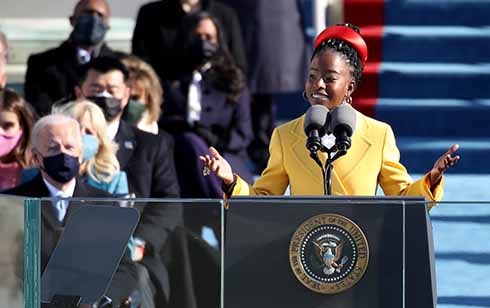 People commonly think of poetry as something that mousy people do in their spare time. It helps them escape from the messy and exciting business of real life. It is one of the parts of the school curriculum that should be skipped over.
People commonly think of poetry as something that mousy people do in their spare time. It helps them escape from the messy and exciting business of real life. It is one of the parts of the school curriculum that should be skipped over.
Amanda Gorman, the United States Youth Poetry Laureate who read her poem ‘The Hill we Climb’ at the inauguration of President Biden, certainly challenged that view. Not only was she young, confident, alive and dressed by Prada, but both the poem itself and the reading of it took the Inauguration to new depth. ‘The Hill we Climb’ was a personal imagining of the urgency, the cost and the importance of unifying the nation. It was Amanda’s dream, but the craft with which she wrote and spoke it made it a universal dream. It invited its hearers to the inauguration not only as a political event but as a human event.
Poetry can do that. Good poems catch the human depth of all our encounters: with ourselves, with the people we love, the world around us, with politics, science and all else. They do it by inviting their writers to explore the depths of their own gifts, and especially the gift of words, of rhythm and sound, of memory and of silence. Amanda’s poem is notable for its rhythm. The many rhymes, repetitions and the strong emphasis on the last word of each line are reminiscent of rap, a poetic language drawn from the Black American culture that Amanda inherited. From these she crafted her personal statement of hope in hard times spoken in the name of the nation.
And yet the dawn is ours
before we knew it
Somehow we do it
Somehow we’ve weathered and witnessed
a nation that isn’t broken
but simply unfinished
The place that poetry has in education is important. It is the canary in the mine from whose health we can discern the health of our culture. Poetry ought be more than a slice of a course taken by a few senior students; more than a hobby of a few that is tolerated but not encouraged; more than a handkerchief tossed to teenage angst. Such attitudes to poetry come out of a culture that identifies human development with economic growth, and confines the role of education to equipping young people to fit economic needs. A decent educational vision focuses on the full human development of each person and sees the good of society secured by reflective persons who are attentive to the needs of each other and of the society. In that vision poetry has an important part at every stage of education.
Poetry offers space for a small child’s natural delight in words, in sound and in rhythm, and encourages them to experiment with words. As they grow, writing poetry also provides a discipline that allows them both to explore strong emotions and to reflect on them. The self-absorbed and lush poetry of early adolescence is tempered by the demands of finding the right words and rhythms through which to express strong feeling. As students’ experience grows, so does their reflectiveness.
Poetry will never be everyone’s gift or enthusiasm. But everyone benefits when in society it is highly valued. It contributes to inner freedom. Dictators like Stalin have known that. They killed and exiled poets who compose words that cut through propaganda and hold to truth. Whether in Amanda Gorman’s United States or our Australia we ignore poets and dismiss poetry at our peril.
Image: Amanda Gorman at the 2021 inauguration of Joe Biden as President of the United States. Getty Images